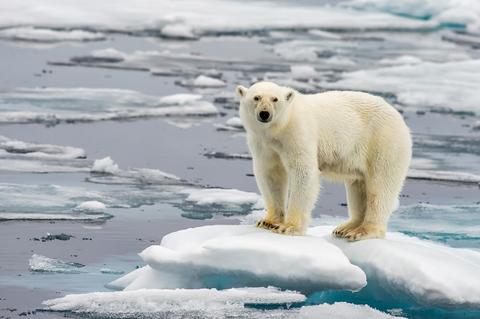
Climate change: how to rethink the system
Heat waves, torrential rains, violent hurricanes, these increasingly frequent events are just the beginnings of climate change, which today appears to be inescapable. Yet a report by the Intergovernmental Panel on Climate Change (IPCC)* published in October 2018 suggests that there is still a tenuous chance to act to limit global warming.
Two experts from Sorbonne University, Professor Hervé Le Treut, climatologist and director of the Pierre-Simon Laplace Institute (IPSL) and Luc Abbadie, professor of ecology and director of the Institute of Ecology and Environmental Sciences (IEES), shed light on the complex issue of climate change.
Climate change, a slow and irreversable process
Today at +1°C, the increase in global temperature is a slow and discrete process. It takes time for the atmosphere and the ocean to warm up. This is why the major consequences of this climate change are not yet visible.
As a result of the accumulation in the atmosphere of greenhouse gases (GHGs) emitted over the last few decades, current phenomena such as droughts, hurricanes, floods, etc. are, in reality, only the first symptoms that confirm the diagnosis made since the 1970s or 1980s by the models. But the real climate fever, according to the experts, will only arrive in a few decades.
This slow change is largely unavoidable. The annual amount of C02 released into the atmosphere has increased tenfold since 1950. As C02 remains in the atmosphere for a century, the tons of carbon released are accumulating each year in an increasing manner.
"We already cannot change what will happen in 20 or 30 years. The problem of climate change is cumulative and irreversible," says Hervé Le Treut.
With a demography that is growing faster and faster to reach nine billion inhabitants on Earth in a few decades, the problem is only getting bigger and more complex with time.
Hervé Le TreutWe cannot change what will happen in 20 or 30 years. The problem of climate change is cumulative and irreversible.
What does a 0.5°C difference in global worming mean?
During the 2009 negotiations in Copenhagen, countries adopted the objective of keeping the rise in average global temperature below 2°C compared to the pre-industrial era. Beyond this threshold, the risks of global warming increase considerably. Six years later, at the Paris Summit, the countries most vulnerable to climate change requested a report from the IPCC on keeping the temperature below 1.5°C in order to set international targets that
take into account the most precarious situations.
The major scientific contribution of this IPCC report, published in October 2018, is to apprehend what 0.5°C represents in terms of impact for the planet and to study what this means in terms of the targets to be met.
Consequences of global worming at 1.5°C or 2°C
Unprecedented transitions in a global approach to the climate problem
According to the IPCC, keeping the global temperature below 1.5°C will only be possible at the cost of radical transformations. Indeed, to meet this objective, global GHG emissions would have to decrease well before 2030 and disappear completely by 2050, which, according to the experts, seems unrealistic.
According to Luc Abbadie and Hervé Le Treut, before implementing radical solutions, it is necessary to take the time to consider the issue of climate change in its entirety. By acting in a hurry without taking into account the complexity of the problem, "the risk is to generate solutions that can represent real ecological disasters," says Luc Abbadie. "There are no miracle solutions. We are faced with a whole range of problems that must be addressed in a systemic way.”
Thus, to reduce the amount of C02 in the atmosphere, one of the solutions recommended by the IPCC is to use negative emission technologies. This technique consists of recapturing atmospheric C02 through photosynthesis and by increasing forest areas. However, this reforestation is in direct conflict with the future expansion of agricultural land required to meet the 50percent increase in food needs by 2050.
“We are facing a climate problem, but also social, demographic and political problems," adds Hervé Le Treut. "We will not be able to do everything: preserve biodiversity, stop greenhouse gases completely, maintain social peace. The future ahead of us is one of choices and trade-offs. We will be forced to compromise between social, ecological and climatic risks and more."
Considering solutions at different scales
Because the climate problem is being played out simultaneously on very different scales, responses must be considered at different levels.
“As the political system is globalized, we need both large international meetings to reflect together on the challenges facing the planet and a national scale to defend our interests as a country," says Hervé Le Treut. “It is also at the national level that energy production is considered. At the same time, the regional scale is essential because it is the scale of the direct impacts of climate change, and that of part of the solutions."
According to Hervé Le Treut, it is at this local level that urban planning, housing, agriculture and transportation, all major issues in reducing greenhouse gases, can be better thought out. This is where concrete solutions can be proposed and choices made according to the specificities of each territory.
Lastly, Luc Abbadie believes that we must not forget the level of the individual citizen: "Each of us has a responsibility to fight, at his or her level, against waste, particularly food waste, and to make choices in our lifestyle.”

La transition exigée par le changement climatique nécessite des savoirs nouveaux © Shutterstock
Luc AbbadieEach of us has a responsibility to fight, at our level, against waste, especially food waste and to make choices in our lifestyle.
An opportunity to innovate
While individual awareness of climate change has increased significantly in recent years, the need to raise awareness and educate on the subject remains. Universities have a role to play in raising awareness, by informing the general public about the complexity of the choices to be made and the need to debate them.
"Action cannot be taken without a global understanding. It is our duty as academics to evaluate solutions and to disseminate knowledge so that society can grasp them and move the debate forward," says Luc Abbadie. "We have an important responsibility: to train the citizens and decision-makers of tomorrow."
According to Hervé Le Treut, we must also develop continuity between research and applications in society, and make research operational. The transition required by climate change requires new knowledge. Academics are opening up scientific avenues and communicating and promoting the results to make an effective contribution to the environmental transition.
Luc AbbadieAction cannot be taken without a global understanding. It is our duty as academics to evaluate solutions and disseminate knowledge so that society can grasp it and move the debate forward. We have an important responsibility: to train citizens and descion-makers of tomorrow.
This is what the Institute for Environmental Transition at Sorbonne University is proposing. With 54 laboratories and approximately 2,000 researchers, teacher-researchers, doctoral students and engineers at Sorbonne University directly involved, this institute aims to become a platform for interaction between science and society. Thanks to interdisciplinary approaches, the ITE wishes to confront, enrich and articulate the different facets of the transition to ensure that the scientific innovation produced on a daily basis in the laboratories leads to operational solutions for citizens.
This climate change crisis can also be seen as an opportunity to innovate.
"If France becomes a driving force and takes the lead in change, it will become normative and competitive. Innovation to fight climate change can be seen as a powerful and strategic development axis for the country. It is an invitation to build different things, to rethink the system entirely," says Luc Abbadie.
* Created in 1988, the IPCC assesses the state of scientific, technical and socio-economic knowledge on climate change, its causes and its repercussions. It identifies ways to limit the extent of global warming and the possibilities of adapting to the expected changes.
